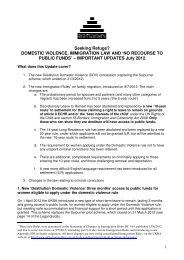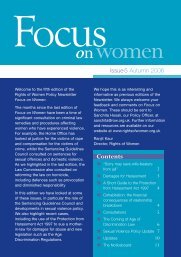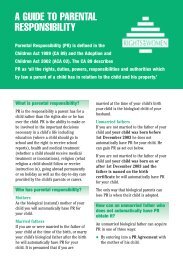Seeking Refuge? - Rights of Women
Seeking Refuge? - Rights of Women
Seeking Refuge? - Rights of Women
Create successful ePaper yourself
Turn your PDF publications into a flip-book with our unique Google optimized e-Paper software.
• to be adjourned (to take place on a date later<br />
than it is supposed to); or<br />
• to be transferred (taken out) from the fast-track<br />
(see the Fast-track Procedure Rules 13(b)(c), 28<br />
and 30).<br />
Under Rule 28 <strong>of</strong> the Fast-track Procedure<br />
Rules, a fast-track appeal can only be adjourned<br />
when:<br />
• There is not enough time to hear the appeal.<br />
• One <strong>of</strong> the parties to the appeal, either you or<br />
the Home Office, has not been properly given<br />
the information about when and where your<br />
appeal will take place (information is properly<br />
given to you and the Home Office when it has<br />
been given to you in the way described by the<br />
Procedure Rules).<br />
• The AIT is satisfied by evidence given to them<br />
that:<br />
o the appeal cannot be justly determined<br />
(decided fairly) on the date it is arranged<br />
for; and<br />
o there is a date in the future (not more than<br />
10 days after the original hearing) when it<br />
can be justly determined (decided fairly).<br />
Your legal representative may ask for an<br />
adjournment if, for example, you are too unwell<br />
to attend your hearing on the date that it is set.<br />
Under Rule 30 <strong>of</strong> the Fast-track Procedure<br />
Rules, a case can be taken out <strong>of</strong> the fast-track<br />
when:<br />
• all the parties agree to it;<br />
• the AIT is satisfied that there are exceptional<br />
circumstances, which mean that the appeal<br />
cannot be justly determined; or<br />
• the Home Office has not followed a rule or a<br />
direction <strong>of</strong> the AIT and the AIT is satisfied that<br />
your case would be harmed by that failure if<br />
the appeal were to go ahead.<br />
Some examples <strong>of</strong> exceptional circumstances<br />
that may result in a case being taken out <strong>of</strong> the<br />
fast-track are where:<br />
• A case is unsuitable for the fast-track because it<br />
is too complicated.<br />
• Further evidence is needed, such as a medical<br />
or other expert report, in preparation for the<br />
appeal.<br />
• Further research is needed to prepare the<br />
appeal.<br />
When asking the AIT to have the case taken out<br />
<strong>of</strong> the fast-track, your legal representative will<br />
have to show not only that there are exceptional<br />
circumstances; but that these mean that the<br />
appeal cannot take place in the fast-track.<br />
If your case is taken out <strong>of</strong> the fast-track, you are<br />
likely to be released from the fast-track detention<br />
centre.<br />
If your legal representative is unable to represent<br />
you in your application to be taken out <strong>of</strong> the<br />
fast-track or appeal, for example, because you are<br />
not entitled to public funding, you can represent<br />
yourself.<br />
Before the appeal<br />
The following sections on appeals and preparing<br />
for them apply to you whether or not you are in<br />
detention.<br />
As stated above, it is important to get legal advice<br />
and representation at any appeal. When you get a<br />
legal representative (who may be a solicitor or an<br />
immigration advisor, see above) he or she will tell<br />
the AIT that they are representing you. This is<br />
important, as documentation about your appeal<br />
will be sent both to you, and to your legal<br />
representative. If you change your address, it is<br />
vital that you tell both your legal representative<br />
and the AIT, to ensure that documents are sent to<br />
the right address. If you do not do this you will<br />
not receive important information, such as when<br />
and where your appeal is being held.<br />
Once you have completed the correct notice <strong>of</strong><br />
appeal and sent it to the AIT, the AIT will give it to<br />
the Home Office as soon as they can.<br />
Once the Home Office has received the notice <strong>of</strong><br />
appeal, they must send you and the AIT the<br />
documents that are relevant to the appeal (Rule<br />
13 <strong>of</strong> the Procedure Rules). This may include:<br />
• the refusal letter and any reasons they have for<br />
refusing you protection in the UK;<br />
26<br />
R (Yogathas) v Secretary <strong>of</strong> State for the Home Department and R (Thangarasa) v Secretary <strong>of</strong> State for the Home Department<br />
[2002] UKHL 36<br />
27<br />
R (L and another) v Secretary <strong>of</strong> State for the Home Department [2003] EWCA Civ 25<br />
49
















